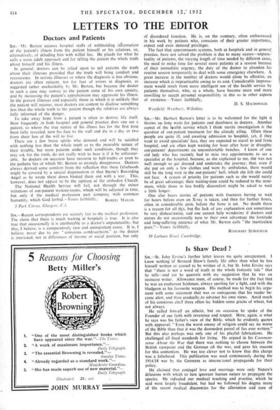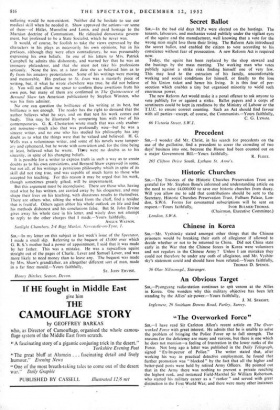Is Shaw Dead ?
SIR,—St. John Ervine's further letter leaves me quite unrepentant. I know nothing—of Bernard Shaw's family life other than what he has himself written or caused to be written of it, but St. John Ervine says that " there is not a word of truth in the whole fantastic tale " that he tells—and yet he quarrels with my suggestion that he was an insincere writer. Allowance must, of course, be made for the fact that he was an exuberant Irishman, always spoiling for a fight, and with the bludgeon as his favourite weapon. His method was to begin his argu- ment with some statement that was so outrageous that his reader be- came alert, and then gradually.to advance his own views. Amid much of his constious chaff there often lay hidden some grains of wheat, but not always.
He called himself an atheist, but on occasion he spoke of the Founder of our faith with reverence and respect. Here, again, is what he says was his father's view of the Bible, which he evidently quotes with approval: " Even the worst enemy of religion could say no worse of the Bible than that it was the damnedest parcel of lies ever written." But this also perhaps was only one of his playful fabrications. He challenged all fixed standards for living. He argued in his Common- sense About the War that there was nothing to choose between the British viewpoint and the German on the war, and gave his reasons for this contention. He was too clever not to know that this charge was a falsehood. This publication was used continuously during the 1914/18 war by the Germans as international propaganda for their policy.
He claimed that conjugal love and marriage were only Nature's delusions with which to lure ignorant human nature to propagate the species. He ridiculed our medical teaching and practice, which he said were largely fraudulent, but had we followed his dogma many of the recent medical discoveries for the alleviation and cure of suffering would be non-existent. Neither did he hesitate to use our medical skill when he needed it. Shaw approved the actions—or some of them—of Hitler, Mussolini and Lenin, and paid homage to the Marxian doctrine of Communism. He ridiculed democratic govern- ment, but professed to be a State Socialist, which he never was.
It would, of course, be foolish to take the views expressed by the characters in his plays as necessarily his own opinions, but in his prefaces, although they were often contradictory, he was presumably expressing his own beliefs. In one of his letters to Mrs. Patrick Campbell he admits this dishonesty, and warned her that he was an insincere philanderer, and that she must not take his professions seriously. None the less, at a later date she so believed him as to fly from his amatory protestations. Some of his writings were moving and memorable. His preface to St. Joan was a masterly piece of writing, but, if what he wrote elsewhere was true, he did not believe it. You will not allow me space to confirm these assertions frotn his own pen, but many of them are confirmed in The Quintessence of Bernard Shaw (an American publication) by Stephen Winsten, who was his firm admirer.
No one can question the brilliance of his writing at its best, but brilliance is not enough. The reader has the right to demand that the author believes what he says, and on that test his work comes out badly. This may be illustrated by comparing him with twct of his contemporaries. G. K. Chesterton wrote much that was only exuber- ant nonsense—much also that was profoundly wise—but he was a sincere writer, and no one who has studied his philosophy has any doubt as to what the things were that he valued and believed. H. G. Wells was a voluminous writer, and some of his novels were tempor- ary and ephemeral, but he wrote with conviction and, for the time being at least, believed what he wrote. Tbre were no doubts as to his sincerity, in spite of his changing beliefs.
It is possible for a writer to express truth in such a way as to create doubts as to his own convictions, and Bernard Shaw expressed in some, but not all, of his writings a pernicious philosophy which in spite of its skill did not ring true, and was capable of much harm to those who accepted his teaching. For this reason it may be urged that his work, though sometimes greatly gifted, will be impermanent. But this argument must be inconclusive. There are those who, having read what he has written, are carried away by his eloquence, and may shape their lives on his teaching, with disastrous results to themselves. There are others who, sifting the wheat from the chaff, find a residue that is fruitful. Others again abhor his whole outlook on life and find his methods dishonest and his conclusions false. But St. John Ervine gives away his whole case in his letter, and wisely does not attempt to reply to the other charges that I made.—Yours faithfully,
ANGUS WATSON.
Sunlight Chambers, 2-4 Bigg Market, Newcastle-on-Tyne, I.



































 Previous page
Previous page